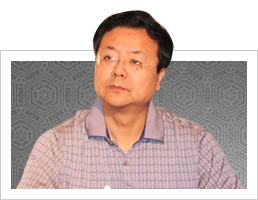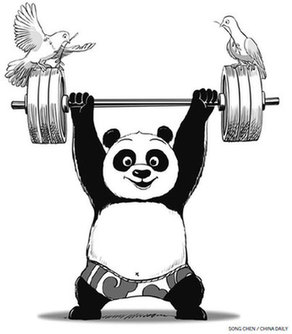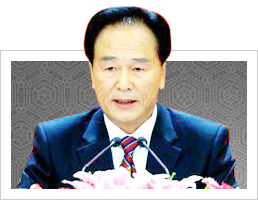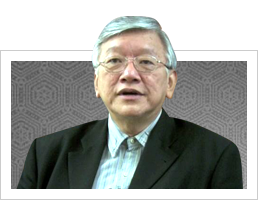Chinese Dream includes strong PLA

The author is deputy director of the Institute for Strategic Studies at the National Defense University.

The centerpiece of the Chinese Dream is the rejuvenation of the Chinese nation, and a nation cannot be rejuvenated without a strong military. A backward defense force makes a country vulnerable. This is a lesson that China has learned the hard way over centuries of humiliation at the hands of imperialist powers.
That is why the Chinese people have been focusing on developing the economy and, in the process, endeavoring to build a strong military. The process started after the founding of New China, but it was slow in the four to five decades that followed.
Now, the country has established an independent and integral national defense industry, and completed the structural transformation of the People's Liberation Army - from an army-centric force to one that is also good at joint operations with the special services that include the PLA Navy and the Air Force.
The outbreak of the Gulf War in the early 1990s, which used information technology to great effect, triggered groundbreaking changes in military warfare. Traditional Western powers used to have a distinct advantage over countries in Asia, Africa and Latin America when it came to military machinery. Today, Western military technology includes the expanded use of smart information technology.
Given the revolutionary changes in the military field, China has no choice but to transform the PLA from a labor-intensive force into a technology-intensive fighting machine, from being an armed force of quantity to a defense unit of quality, for which it has to depend on scientific and technological advancement. Without technological progress, the PLA cannot be a competent force always prepared for combat.
In the 21st century, the comparatively stable strategic environment at home and abroad has ushered in a period of strategic opportunity for China. The Chinese nation has never been so close to realizing national rejuvenation, and never before have the Chinese people been so confident in building a strong nation and a strong military.
But it is equally important to beware of the disadvantages inherent in the opportunity. China faces traditional and non-traditional security problems that threaten its development, and national sovereignty and territorial integrity. The persistent pressure from the Western world, complex territorial disputes, and terrorism and separatism threaten to undermine the country's economic and social development.
Connotations of Chinese Dream
Inspired by the Chinese Dream, more and more people have begun to chase their own dreams, including dreams to receive better education, start businesses, purchase homes and get rich. People firmly believe that as long as they work hard, their dreams would come true. [more]
Chinese dream and China's governance
A great deal will depend on how Xi Jinping will actually implement the core features of the program he has laid out and how he will seek to create incentives and constituencies to support his programmatic goals.In sum, President Xi has now made very clear where he stands and where he wants the country to go under his leadership, and he has achieved wide-ranging endorsement of this overall program. [more]
Chinese Dream includes strong PLA
The PLA as a pillar of State security follows the trend of the times and follows a principle that is different from colonial aggression and expansion. And China firmly believes in the principles of peace, cooperation and development of military ties with other countries. [more]
The Chinese dream and peaceful development
The most difficult issue in the region now is the the relationship between China and Japan regarding overlapping claims on the Diaoyu, or Senkaku, islands group. The problem is residual from World War II, and the historical part of the issues is complicated. That is why Japan PM Abe’s revisionist statement on World War II and its impact does not help. [more]
The year of Chinese Dream
Distinct from the American Dream, the Chinese Dream cannot be a narrative of pure newness. It is the imagining of a better future with the memory of 4,000 years of history, a movement of renaissance expressed in the vision of "civilizational China". [more]
Defeat challenges, realize Chinese Dream
High economic growth in recent decades may have made China more confident of realizing the Chinese Dream, but the country's new leaders face serious challenges that could hamper their efforts to realize the goal.First and foremost is the need to fight widespread corruption. Making this his main priority, President Xi warned that corruption could lead to "the collapse of the Party and the downfall of the State". [more]
World dialogue on the Chinese Dream
The “Personal Chinese Dream” focuses on the well-being of individual Chinese citizens and thus modifies traditional notions of the primacy of the collective over the individual. The dream of the Personal is balanced with the dream of the National. In fact, the fulfillment of The Personal Chinese Dream constitutes a good part of what it means to fulfill the National Chinese Dream. [more]
Making a nation's dream come true
Promoting Chinese concepts in the rest of the world is not very difficult - stop translating key Chinese terminologies (at best, give the appropriate or closest meaning and continue with the Chinese terminology). If kung fu, wushu, rujia, shengren, junzi can be understood and accepted by the outside, why not zhongguo meng? Once you translate a Chinese term you give away the definition of thought. [more]












